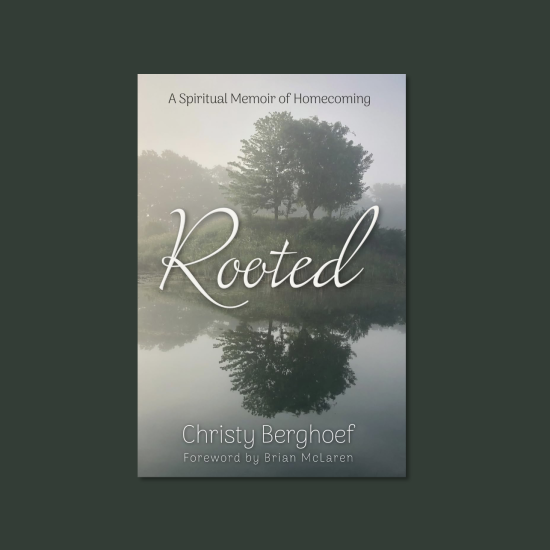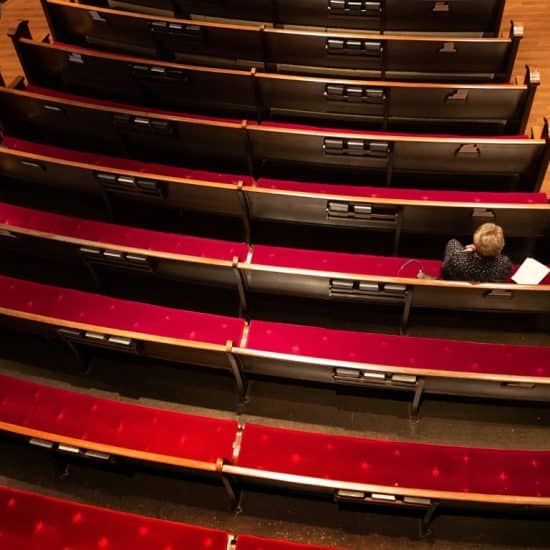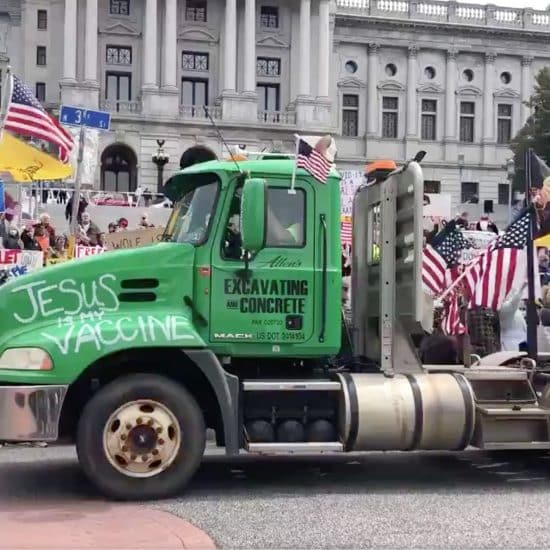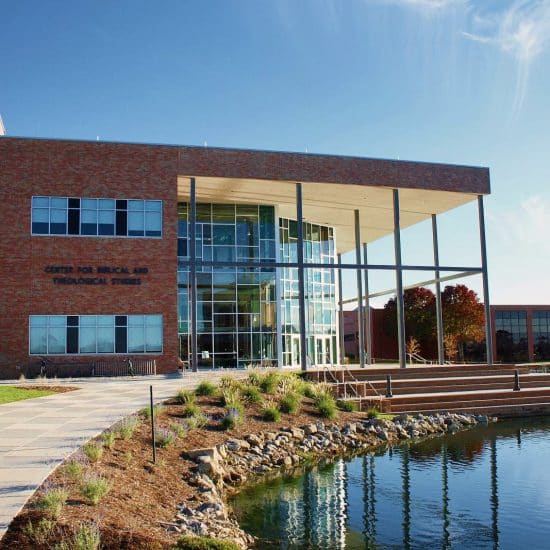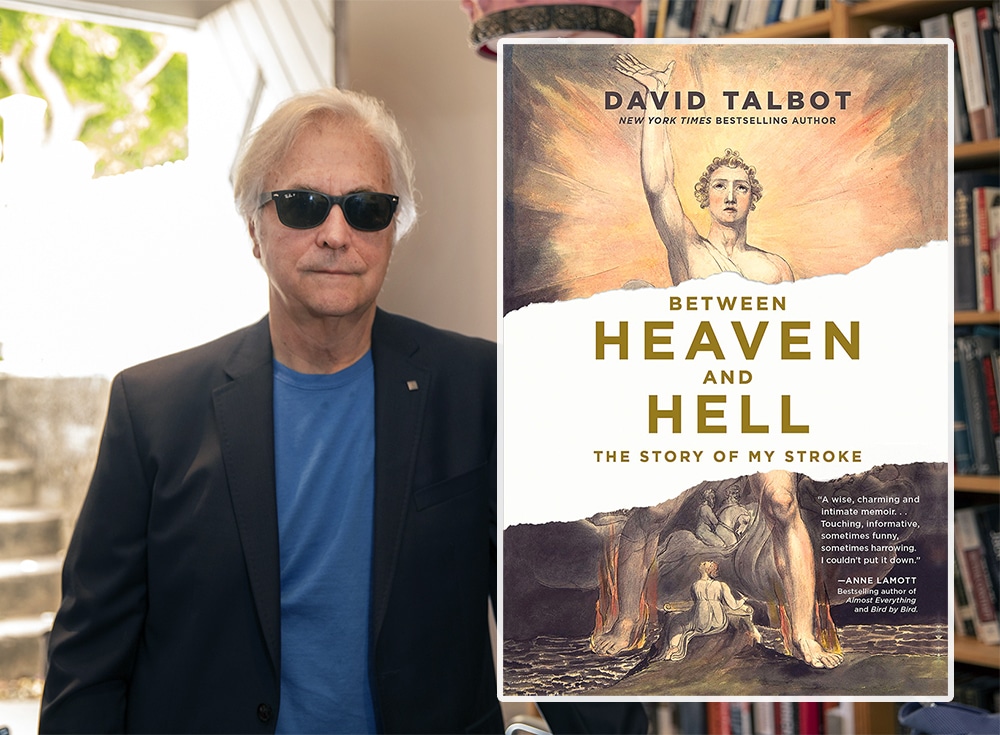

Author David Talbot and his book “Between Heaven and Hell: The Story of My Stroke”. Courtesy images
(RNS) — These days, following my stroke, I’m trying to find the right balance between passionate social engagement and quiet contemplation. Since quiet reflection does not come easily or naturally for me, I’ve been seeking out meditation workshops.
Early one Saturday, my wife, Camille, drove me to an all-morning meditation training session at the Green Gulch Farm Zen Center in nearby Marin County.
For the first hour, my anxiety seemed to slowly evaporate as we sat silently in our lotus positions and felt the rising and falling of our breath. My anxieties these days don’t usually involve my own professional or physical dilemmas — my stroke seemed to mercifully minimize those old frets and fears. But the turmoil of those I love and care about, and the ambient agony all around me, comes at me in never-ending waves. I seem less able to handle other people’s worries because I feel less equipped to help them and protect them in my still fragile state.
In any case, even these collective crises were floating away from me during the first hour of sitting and walking meditation in the Zen Center temple. But this sense of peace didn’t last long. After a break the group slipped back into the disciplinary straits of another lengthy round of meditation. I found it harder to calm my restless mind. The rustic building suddenly seemed cold and drafty; my feet felt chilled and my body stiff.
Apparently Camille was having an even harder time. Suddenly her face — looking a little frantic — was hovering right before me. “I’ve got to get out of here,” she whispered. She seemed gripped by a sort of panic.
Frankly, I was beginning to feel the same way. After enduring the sort of upheaval that has rocked our family lately, there’s only so long you can sit and quietly contemplate the havoc. I wanted to join her as she bolted for the door, but with my impaired eyesight, I wasn’t sure I could find the door handle in the temple’s gloomy light.
An hour or so later, when I joined her on the path that curved through lush Green Gulch Farm all the way down to Muir Beach, with briny gusts of sea air in our faces, we found another type of serenity. You don’t always need a spiritual dwelling to find peace.
And you don’t always need classes run by Zen masters. Reading the right books at the right times in my life has always provided essential solace and guidance. My search for the proper blend of activism and calm has led me to the life and work of Thomas Merton, the Trappist monk who emerged from 27 years of cloistered life in a monastery in the hills of Kentucky to confront the growing apocalyptic evils of the Cold War.
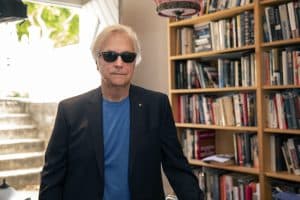
Author David Talbot. Courtesy photo
Although he didn’t watch TV, and newspapers were only a sporadic part of his life, Merton acutely felt the gathering darkness of the outside world by staying in touch through letters with a far-flung network of friends. He realized it was not morally tenable to remain in silent isolation as the world skidded toward nuclear oblivion, so he began sending his painfully sensitive and observant commentaries to small Catholic publications.
When his conservative monastic superiors began censoring these articles, he wrote his thoughts in letters and mailed them to his influential circle of like-minded souls, including Pope John XXIII, Boris Pasternak, Dorothy Day, Ethel Kennedy, Erich Fromm, Walker Percy, Lawrence Ferlinghetti, nuclear physicist Leo Szilard and Shinzo Hamai, the mayor of Hiroshima.
“This country has become frankly a warfare state built on affluence, a power structure in which the interests of big business, the obsessions of the military, and the phobias of political extremists both dominate and dictate our national policy,” Merton wrote in January 1963 in a preface to his collected Cold War letters, which he mimeographed and sent to friends.
“It also seems that the people of the country are by and large reduced to passivity, confusion, resentment, frustration, thoughtlessness and ignorance, so that they blindly follow any line that is unraveled for them by the mass media.”
As Catholic writer and activist James Douglass, author of “JFK and the Unspeakable,” has observed, Merton was so closely attuned to the deeply troubled American psyche — as he fitfully exited and returned to his hermitage within the Abbey of Our Lady of Gethsemani — that he was able to foresee President Kennedy’s violent death.
JFK, wrote Merton, occupied a position within the sharply divided U.S. power structure that was “sometimes so impossible as to be absurd.” Kennedy, he predicted, might “by a miracle” someday “break through” America’s military-industrial mass death cult.
“But such people,” he wrote, “are before long marked out for assassination.”
As death and tragedy rolled in waves through the 1960s, flooding even his remote monastery, Merton still managed to maintain a sense of inner peace, buoyed by his deep Catholic faith. He knew that he would soon lose his sense of direction in the public arena if he didn’t listen to the inner voice he had been patiently nurturing for nearly three decades.
“He who attempts to act and do things for others or for the world, without deepening his own self-understanding, freedom, integrity and capacity to love, will not have anything to give others,” wrote Merton in an essay later collected in a book titled “Contemplation in a World of Action.”
“He will communicate to them nothing but the contagion of his own obsessions, his aggressiveness, his ego-centered ambitions, his delusions about ends and means, his doctrinaire prejudices and ideas … We are living through the greatest crisis in the history of man; and this crisis is centered precisely in the country that has made a fetish out of action and has lost (or perhaps never had) the sense of contemplation. Far from being irrelevant, prayer, meditation and contemplation are of the utmost importance in America today.”
And so now, as the Trumpian sound and fury grows louder by the day, along with the agonized cries in reaction, I try to find moments each day during which I calm my frantic mind and withdraw to a quiet place inside me. I couldn’t seem to find this oasis of serenity before my stroke, but it became my stroke’s gift to me.
Adapted from “Between Heaven and Hell: The Story of My Stroke,” a memoir by David Talbot.

